The Orthodox World celebrated Christmas in the night from 6-7 January.
In Tbilisi, Catholicos Patriarch Ilya II delivered his annual Christmas sermon prior to celebrating Christmas mass at the Holy Trinity Cathedral in Tbilisi.
The Patriarch prayed for the Georgia to be safe within its borders, and for the strength of the Georgian nation.
The Patriarch noted that the Georgian people have endured much danger over the centuries but remained faithful to Jesus Christ and in their hope in God.
The Patriarch prayed for world peace as well and asked for the wisdom to differentiate between good and evil.
Russian President Vladimir Putin congratulated Orthodox Christians and all Russian citizens celebrating Christmas, noting the role of the Russian Orthodox Church in strengthening spiritual and moral foundations of society, the Kremlin press service reported on Tuesday.
"Millions of people all over the world are full with joy and inspiration on festive Christmas days, they share deep feelings of being a part of the centuries-old traditions, passed down from generation to generation," the message said.
"The Russian Orthodox Church and other Christian denominations of Russia play a huge formative role in strengthening spiritual and moral foundations of society, in safeguarding our historical, cultural heritage, in educating young people. Such a large, fruitful work is very important and deserves the deepest recognition," the president said.
Putin earlier presented the Tikhvin Icon of the Mother of God to the Transfiguration Cathedral of St. Petersburg on Tuesday at the Christmas services.
For more than half an hour, the President, along with other worshipers, took part in the all night Divine Liturgy, after which he briefly talked with the Archpriest of the cathedral, Nikolai Bryndin, and presented him with an icon as a gift. In response, the President received an icon of the Kazan Mother of God from Bryndin.
source; commonspace.eu
photo: President Putin of Russia attended a service marking Orthodox Christmas at Transfiguration cathedral in St Petersburg on Monday night






